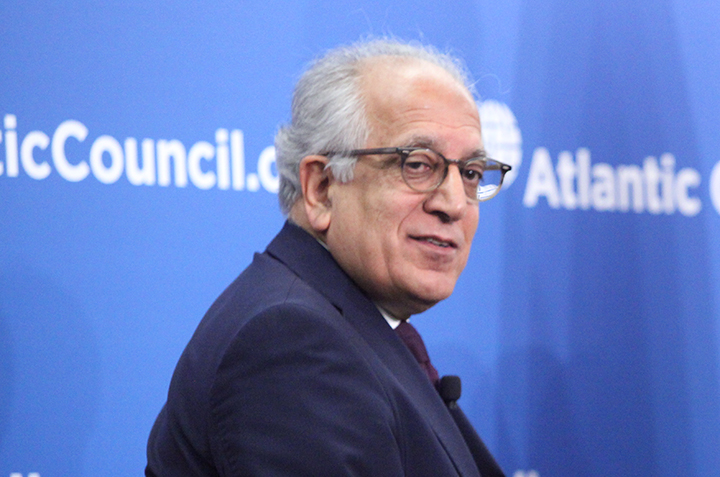 The “integration of civil-military forces” and “sustainable economic development” are critical to the success of state-building efforts, Zalmay Khalilzad, a former US Ambassador to Afghanistan, Iraq, and the United Nations, said at the Atlantic Council on April 20.
The “integration of civil-military forces” and “sustainable economic development” are critical to the success of state-building efforts, Zalmay Khalilzad, a former US Ambassador to Afghanistan, Iraq, and the United Nations, said at the Atlantic Council on April 20.
“There was a clear road map for political transition [in Afghanistan], but we never knew what the final institutions would look like,” said Khalilzad, who is a member of the Atlantic Council’s Board of Directors.
In Afghanistan, differences between former electoral rivals—President Ashraf Ghani and Chief Executive Abdullah Abdullah—have made it hard to confirm the appointments of officials, including Cabinet Ministers.
Besides the political challenges, the Ghani administration is also faced with a resurgent Taliban. Just days after announcing the start of its spring offensive, the Taliban struck Kabul on April 19 killing sixty-four people and wounding nearly 320 others.
Khalilzad spoke at an event to discuss his memoir, The Envoy: From Kabul to the White House, My Journey Through a Turbulent World. Frederick Kempe, President and CEO of the Atlantic Council, moderated the discussion, which was hosted by the Council’s South Asia Center.
Khalilzad, who served as the US Ambassador to Afghanistan from 2003 to 2005, drew on his experience in the country of his birth to offer prescriptions for today’s foreign policy challenges.
“When [Afghans] began fighting each other we became less engaged,” he said. “One lesson is that in some places we are good at counterpunching and not remaining engaged. This was the tragedy of Afghanistan…Imagine if [the Islamic State of Iraq and al-Sham (ISIS)] takes over Damascus or eastern Saudi Arabia…The lessons of state-building from Iraq and Afghanistan will still be relevant,” he added.
Khalilzad advised policymakers to continually question their assumptions of how foreign interventions will play out and what, specifically, the country will look like as state-building occurs.
“At the beginning of something big, don’t assume that you know the outcome,” said Khalilzad.
In Iraq, where Khalilzad served as Ambassador from 2005 to 2007, Prime Minister Haider al-Abadi is faced with a crisis as he struggles to build a cabinet that is independent of the political parties.
In light of continued civil conflict in Syria, Iraq, and Afghanistan, US President Barack Obama—on his trip to Saudi Arabia for a summit of the Gulf Cooperation Council on April 21—called on Saudi Arabia and other Gulf states to help stabilize the greater Middle East region.
“Adjustment is not easy, once you have set a course which you have invested a lot. You need strong leadership at the highest level to successfully adjust,” said Khalilzad.
Khalilzad said the United States and Europe must remain diplomatically engaged with “critical regions” of the world. “[The United States and Europe] are in a period of retreat and great exertion followed by [military] withdrawal…we need to stay the course to help maintain order in three critical regions of the world: Europe’s triple crisis from the east, the south, and internally, and in Asia, where a new balance of power is needed and…in the broader region of the Middle East—which is the least institutionalized of the three critical regions,” he said.
As Europe continues to deal with the migrant crisis—the largest movement of people into the continent since World War II—the threat posed by ISIS stemming from the instability in Iraq, Afghanistan, and Syria, and as China continues to entrench its foothold in Southeast Asia, Khalilzad contended that the West needs to engage with its allies to address these critical crises. State-building is one tool that the United States can use, he said.
Mitch Hulse is an intern at the Atlantic Council.
Image: Zalmay Khalilzad, a former US Ambassador to Afghanistan, Iraq, and the United Nations, and a current member of the Atlantic Council’s Board of Directors, discussed his memoir, The Envoy: From Kabul to the White House, My Journey Through a Turbulent World, at an event hosted by the Council’s South Asia Center on April 20. (Atlantic Council/Victoria Langton)
